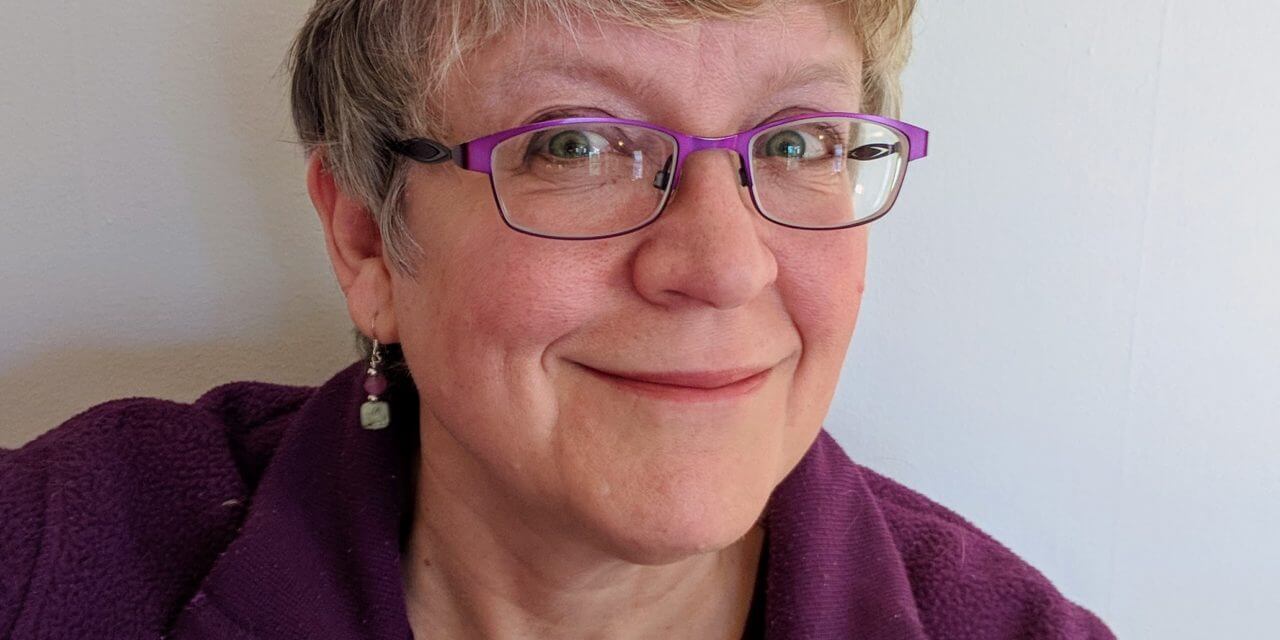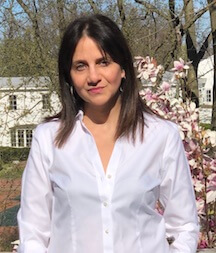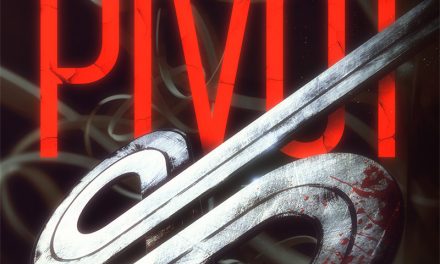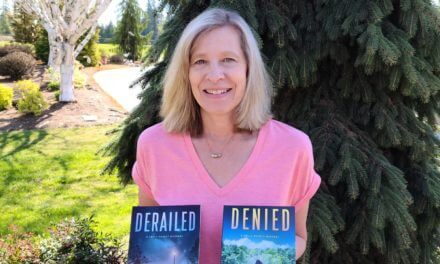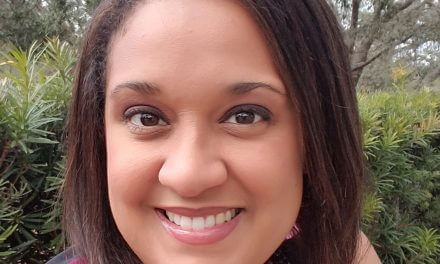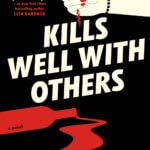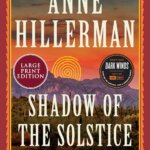Today I chat with Sandra Hutchison, author of The Awful Mess: A Love Story. Born and raised in Florida, Sandra survived her parents’ move to the small town of Greenfield, Massachusetts and eventually stopped sulking about it, though it’s possible she’s still working it out in her fiction. She currently lives in upstate New York. A former adjunct professor, high school English teacher, acquisitions editor, marketing manager, creative director, and freelance copywriter, she founded Sheer Hubris Press in 2013 to put all those skills to work at the same time. She has published six novels, the most popular of which is The Awful Mess: A Love Story.
SS: My ex-husband was born and raised in Little Falls, NY, so I’ve spent more than my share of time in your neck of the woods. What did you want to grow up to be as a child? Has that child’s desire appeared in your work?
SH: I loved to read, but what I really wanted to be was an illustrator. However, I couldn’t get into any studio art classes my freshman year at UMass, and ended up declaring an English major before the end of the semester. (I hadn’t been a huge fan of high school English, but I loved college English.) Photography and art appreciation are now favorite hobbies, treasured all the more because they’re just for fun. (I remind myself of that every time I’m tempted to compete for a spot in an art show.)
SS: I was born into a family of artists and broke the mold when I became a photographer. I was married to an art historian for thirty-four years, so a lot of art appreciation seeped in by default. And I was an English major too. So we have a common background. Have you always been driven to write? Or did you begin writing in response to a particular stimulus?
SH: Oh, I’ve always written. I still have a “book” I wrote in grade school about a mermaid who gets pregnant (amusingly, my first novel forty years later was about an infertile woman who gets disastrously pregnant). Before I started writing novels, I published a ton of fanfic, mostly when shows bothered me by ending too early or going off in a direction I hated (looking at you, X-Files). It was great practice for joining a community, getting and giving feedback, and toughening up, and I still have many of the friends I made that way. I did get a master’s in fiction writing, but I can’t recommend that unless 1) you’re devoted to literary fiction, 2) you want a day job teaching, 3) the program is taught by kindred spirit authors, and 4) it has the kind of prestige that will really open doors for you, or it’s free.
SS: I felt the same way about an MFA. I already had a string of initials after my name, didn’t plan to teach, just wanted to learn to write well. So I ended up in the Stanford University online Novel Writing program. What’s the first book that made you cry? Made you angry? Made you rejoice?
SH: As with so many of us, my first serious book cry was probably for Beth in Little Women. I read a lot of Holocaust fiction and nonfiction as a girl, so that would have supplied some tears and anger. I lived through desegregation in Tampa, so I read a lot about racism, too. I spent my teen years mostly reading science fiction and fantasy, but I’ve always gravitated to a funny, heartfelt love story. Jane Austen remains my all-time favorite, but I’m also a big fan of Barbara Pym, Tim Farrington, Elinor Lipman, Susan Elizabeth Gilbert, Eva Ibbotson, and Maddie Dawson. (Pym isn’t big on happy endings, but I forgive that because she’s so damned funny.) I also love Julia Spencer-Fleming, but her books are really mysteries.
SS: What would you say is your biggest failure in life? Has it appeared in your works?
SH: I’m not very diplomatic or politically astute, and my heroines tend to share that failing. It makes our lives harder, but we can be pretty entertaining when we’re not pissing people off.
SS: How has Covid-19 affected your writing? Your future writing?
SH: According to the personality tests I’m right in the middle between introvert and extrovert, but I took to the pandemic like a pig in mud. It helped that I hung up my teaching for the duration, so I didn’t have to cope with Zoom on a daily basis. (The teachers who did are true heroes.) Yes, I doom-scrolled, and, yes, I missed seeing a lot of my friends and family outside of hikes and outdoor picnics, and yes, my productivity sucked. However, I almost never had to put on make-up or real clothes. I used the time to go on a serious romantic comedy reading tear, and because I enjoyed it so much I decided that was the genre I’d try next. (I’m currently deciding what to do with a contemporary Pride and Prejudice retelling that plays off the economic plight of adjunct professors). Someday I might also add to my Lawson series with a love story for a young mortician who has to get through the pandemic, but I like to let history percolate for a while before I take it on.
SS: Hilary Mantel (Wolf Hall) says that a Catholic upbringing is the only qualification a writer requires. Can you relate to this idea? Do you have any similar writing qualifications?
SH: Interesting question! I grew up unchurched with two agnostics who think I’m nuts because in adulthood I’m a devoted (and extremely liberal) Episcopal church lady. I do think that institutions that lead you in a thoughtful, orderly way through Scripture, even the harder and wackier stuff, offer good preparation for writing fiction. All the stories are there, heroes and villains and deep moral themes, especially if you don’t believe everything has to be taken literally. Jane Austen herself was the daughter of an Anglican rector, and Christianity certainly informed her moral outlook. (In Persuasion, the bad guy is guilty of “Sunday traveling,” something I remembered ruefully recently while traveling on a Sunday.) Having said that, I don’t think religious people can lay claim to any special righteousness (or writing chops), and villains very often cloak themselves in piety. (In my first novel there’s an Episcopal priest who does a Bad Thing, and I’m sorry to say that over the years I’ve known three priests in real life who proved to be all too human in the same way.)
SS: If you time-warped fifty years into the future and found that something you created has become a trope or buzzword, how would you feel? Would you feel cheated of royalties or vindicated as a genius?
SH: I’d just be tickled. My favorite thing is to hear I kept someone up too late. A friend once told me I made her miss her subway stop and I still treasure that.
SS: Do you believe you write the kind of book you’d want to read?
SH: Yes, of course. But if I’m lucky I get some good tough editing notes and realize I need to revise it so I can end up with a book that’s EVEN MORE the kind of book I’d want to read.
SS: What is your most recent book? In twenty-five words or less, tell me why a reader should start your book next.
SH: I recently revised a short prequel to my Lawson series to include a Christmas theme. The Less Than Fresh Start involves a divorce AND a bad smell and should be free on all the retailers by now, or you can get it at my web site. That’s a painless way to try me out, unless you want to listen to the audiobook for The Awful Mess. Tantor published that, so it’s on Hoopla and most subscription services.
SS: You may have seen a study by psychologists Arthur Aron, Edward Malinat, Elaine Aron, Robert Darrin Vallone, and Renee Bator floating around the internet. It examined whether romantic intimacy between two strangers could be achieved over the course of 45 minutes by answering a series of probing questions. Can you really build an intimate relationship with a stranger in the span of 45 minutes? How might you use this in a book?
SH: Ha! I literally DID use that in my last published novel. The hero in The Utter Catastrophe tries to woo the heroine on the down low by casually sneaking in questions from that New York Times article, “The Thirty-Six Questions that Lead to Love.” Of course, she figures out what he’s up to and starts answering in ways designed to freak him out.

SH: My second novel The Ribs and Thigh Bones of Desire addresses the aftermath of a rape as well as a consensual but arguably problematic relationship with an older guy, so it plays a big role in that one (though it’s set in the 70s). I have zero respect for the idea that a man can’t stop when he’s asked to, I don’t care how carried away he is. (That’s my only serious beef with Outlander.)
SS: It is often believed that almost all writers have had their hearts broken at some point in time. Does that apply to you?
SH: Oh, sure. (Hasn’t everyone?) Unlike the folks in my novels, I haven’t slept with a married priest or suffered a rape or had my whole family die in a plane crash. I’ve never had to cope with a police shooting, an opioid addiction, or immigration detention. But I have had my heart broken. I guess that’s useful from a writing point of view!
SS: Do you think political statements belong in women’s fiction? Would you write a novel that was a political tract?
SH: A tract? No. But a highly accessible, nuanced novel that addresses political issues in a way that allows readers to draw their own conclusions and maybe develop a little more empathy for people in a tough spot? That’s actually pretty much my thing.
LIGHTNING ROUND:
Describe your books in 3 words: Humorous, warm, engaging.
Favorite thing about your genre? Women finding a way.
Another genre that you would love to write: Romantic comedy (and I just did).
When writing, are you a night owl or morning person? It varies.
Pantser or Plotter? Pantser, but I have an idea where I want to end up.

Your favorite guilty pleasure: Popcorn. I’ll probably break a tooth on it someday.
Number one book boyfriend or girlfriend is: Winslow from The Awful Mess, the first hero I wrote and still my favorite stand-up guy.
Your favorite genre of romance: Romantic comedy.
Who’s your favorite women’s fiction author? Jane Austen.
********************
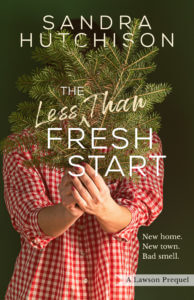
********************
An excerpt from the first chapter of The Less Than Fresh Start.
ONE NIGHT HER HUSBAND came home from work – late, as had become usual – stood in front of the open refrigerator, and said, “Where’s the beer?”
“We’re out,” Mary said, and her heart started pounding.
Roger was still staring into the refrigerator as if it might magically appear. “I told you last night we were out. Why didn’t you get any?”
“Because I didn’t feel like it.” She had told herself at the store that she was sick and tired of buying him cases and cases of beer and watching him drink it down. He could damned well buy his own and, yes, she would tell him so.
She’d felt confident, even brave, at the store. Not so much anymore.
He opened his mouth and let it stay open, just blinking at her for a long moment. “What do you mean, you didn’t feel like it? You got groceries, didn’t you?”
She took a deep breath and turned away to continue heating up his dinner. She’d already eaten earlier, during the news on TV, and put his away his portion until he got home. “I figured you could start getting it yourself. I don’t feel like lugging it around anymore. It’s really heavy, you know, the amount you go through in a few days. You could go get it right now. Your dinner will be ready when you get back.”
She tried to quell a nervous tremor in the hand stirring the spaghetti sauce. Her body seemed a lot more worried about this stand she was taking than her head was. Her head told her that Roger would throw a little tantrum at worst. Maybe deliver his semi-annual lecture about how hard he worked and how his job at his father’s real estate development company involved longer hours and higher pressure than her low-stress, low-level, poorly-paid editorial job, and why couldn’t he count on her support, goddamn it, she was his wife, wasn’t she? Maybe he’d slam a dish or kick a chair or something.
Unpleasant as that prospect was, it would give her the opportunity to bring up those increasingly long hours, or the stops at the bar on the way home, or the amount of drinking in general, or his growing absence from their marriage.
Which meant, of course, that he would probably bring up her inability to get pregnant, and then she’d probably cry because, after all, what the hell was she supposed to do about their infertility that she hadn’t already done?
But at least then it would be out there. And it needed to get out there. They hadn’t had this particular fight in months. Afterwards, maybe the pall that had fallen over their evenings would be lifted for a while.
Maybe he’d finally be willing to discuss IVF. Or adoption.
But what actually happened was that Roger turned white, let the refrigerator door swing closed, and slapped her across the face.
********************
You can follow Sandra on social media here:
Website | Facebook | Twitter | Bookbub | Amazon | Goodreads
********************
This post contains Amazon Affiliate links. As an Amazon Associate, I may earn a small amount from qualifying purchases.
